Belgium has never been known as a hockey hotbed. For women and girls especially, it is incredibly difficult to even obtain opportunities to play the game. Great strides have certainly been made in the North American leagues, the NWHL and CWHL – we still have a ways to go, but “Grow the Game” is as strong as it has ever been.
But, with the possible exceptions of Sweden, Finland and Russia, you have to recognize too that there is a level of disparity between those aforementioned leagues and countries, when compared to a smaller nation such as Belgium. An immense passion – one that is often encompassed by some hardship as well – needs to be had in order to play the sport regularly and to stick with it. For the Belgian players who love the game, they make due. Thanks to a young player – Valentine (Val) Maka – there is at least a strong flame to keep the passion burning for players in her country.
“It’s gonna sound really cliché,” Maka told THW, “but on a school night the movie The Mighty Ducks was on TV and it held my attention. Furthermore, my mom used to play hockey, so she took me to watch some games. And right after the first game that I saw I told her, ‘That’s it mom – I wanna do it too!’ And that’s pretty much how my hockey journey all started.”
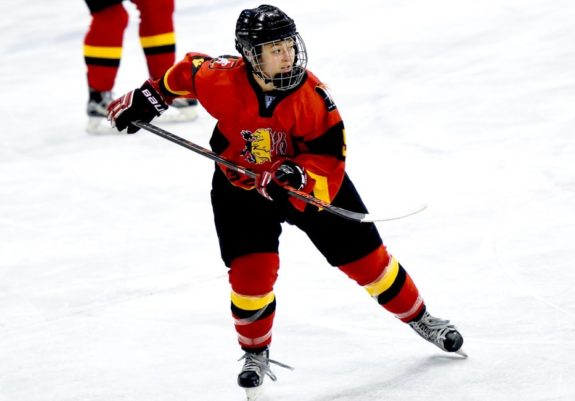
THW spoke with Maka at length so that we could get a better sense of what women’s hockey in Belgium is all about, and so that we could spotlight a player who is certainly turning some heads in her own region. Perhaps she may even catch the attention of one of the professional leagues.
Starting the Game Later Than Most
What is rather impressive to note is that Maka has not be playing hockey for very long. At the time of this interview, she is all of 23 years old and has many years left to play. In most instances though, perhaps especially in North America, a hockey player might start skating before they are even in kindergarten, and then eventually begin playing organized hockey once they reach grade school ages. In the case of Maka though, she did not begin playing until much later.
“I actually wanted to start playing when I was seven,” she explained, “but I couldn’t. So, I started to play hockey around the age of 15. I guess it’s never too late to start when you really wanna do something.”
Since that time hockey has carried her quite far. Consider if you will that even though she began playing at 15, Maka has already played for the Belgian national team in six different IIHF Women’s World Championship tournaments. Not only is that a testament to how she has progressed as a player, but it confirms her aforementioned statement of how badly she wanted to play. It is rather profound to go from being a novice teenager to representing your country.
Like many hockey lovers, Maka finds inspiration from today’s contemporary stars from both the men’s and the women’s sides. Particularly in women’s hockey, she recognizes that the premier faces in the game are able to cross borders and encourage young players from a wide variety of nations.
Asked which players she admires, Maka responded with the following:
“Ovi for sure. Ovechkin will always be my favorite player because of how talented he is but also because he brings so much to his team as a teammate. But also, I would want to talk about Hilary Knight. This woman is incredible! First, I like the way she spreads her love for hockey. Then, for the fact that she is the first female skater practicing with NHL players – wow! What inspires me the most is how she sees women in sport, in general. She fights for the equality of women in hockey. And I think this is amazing. I wish I could have as much impact on the hockey world here in Belgium than she does in the hockey world in general. She is just amazing!”
From Belgium to Canada and Back Again
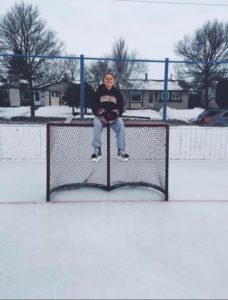
Belgium is a nation with a population of over 11 million people. Many will know the names of the larger cities in the country, such as Brussels or Antwerp. Outside of the larger cities though, other areas of Belgium are not well known in North America. Maka hails from one of those smaller parts of her country. For any hockey players who may have grown up in small towns among the Canadian plains, you might be able to feel some common ground with her.
“I lived in a small village called Fraire all of my childhood,” Maka recalled. “Not much to do around there. But as it’s a small town, people are close to each other and caring. I used to just go to school, hang with my friends from school, play in the backyard with them. It was a quiet and nice childhood. I used to see my friends a lot. It was the childhood where kids still went and played outside, and didn’t go on their smartphone or on their tablets. It used to be the ‘we are going to take our bike to go to the farm and pet the cows’ sort of childhood. It was just great. I also used to do karate, ballet and horseback riding. So I had never been involved in any team sport before hockey.”
Shortly after Maka began playing hockey, she had the opportunity to travel and play the game in one of the most hockey-passionate cities in Canada. If nothing else, it only fueled her love for hockey even more. Her commitment to the game in her own country was accentuated tenfold.
“After graduating from high school in Belgium,” Maka recalled, “I went to Winnipeg, Manitoba for a year where I was in an exchange program. I went to high school there and graduated again. I had the opportunity to play hockey there. I played for the school, Oak Park High School. I was a member of the Oak Park Raiders for an entire season. Then when I came back to Belgium, my mom moved to another city, where I still live, called Liège .”
Playing the Game in Belgium
Follow closely to what Maka says about the rather limited opportunities she has to play the sport she loves in her homeland. Her own commitment to a sport with very limited opportunities at home seems to echo her own sentiments about what Knight has been able to achieve. It may also make you feel thankful for your own hockey opportunities.
“It’s actually not that easy to play hockey in Belgium when you are a girl because you don’t have too many options,” Maka explained. “Back when I was 15, to be able to play hockey I had to go to Charleroi. This is the closest city from the town, which is maybe a 30-minute drive. I had to play with guys because there weren’t any girls hockey teams. When I joined the team there were four girls, including me. Two years later I was the only one left.”
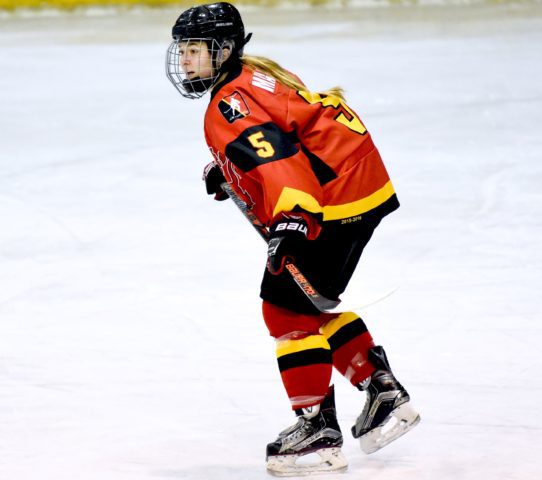
While she still plays on boys teams from time to time, Maka has been playing with a women’s team – Grizzlys Liège – since she returned from Canada. For many years it was the lone Belgian women’s team, and the squad competes in a German women’s league in order to participate in league play and compete for a championship. You make do with what opportunities you have.
Maka explained, “The thing is now in 2018 we have two girls hockey teams in Belgium. Only two. And those two teams have to play in a German league to be able to have a championship. That’s the reality. Otherwise you have to play with the boys – something I’ve done all my hockey career, and that I’m still doing. So no, there aren’t a lot of opportunities to play in Belgium for girls. Because you need to know that ice hockey is not famous here. Just a few people know about ice hockey in Belgium.”
A Look at Grizzly Liège
For the 2017-18 season, Maka led the Grizzlys Liège in goal scoring, and finished second on the team in points. Her 24 goals in 15 games were the second most in the entire league behind the Hannover Indians’ Bettina Evers’ 26 tallies. Maka’s 37 points tied her for the fourth highest total across the league. The compositions of both the Grizzly Liège team and this lower-tiered German league as a whole are rather interesting.
“We’re a team with a lot of new girls who recently started to play hockey, mixed with some girls who have played for more than 10 or 15 years now. We have two girls from the Belgium national team, and one girl who used to play for France’s national U18 team. So you can either have a high school girl or a woman who works and has kids. I think the fact that all the girls are so much different makes the team even stronger. This team is actually a family – a family that I’m proud being a member of.”
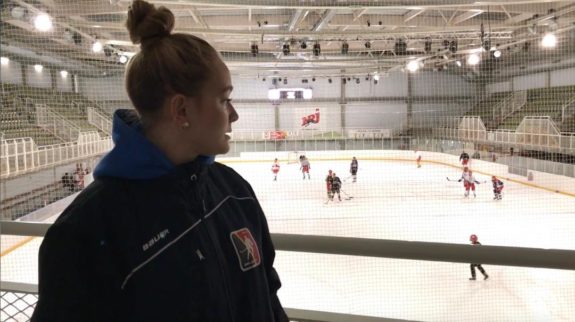
The Grizzly Liège has played in the Germany-3 League for two years straight. In each of those years, Maka and her teammates were runners up for the championship. Likewise, The Grizzly Liège is the only non-German team in their division, named the Landesliga NRW division. The level that Maka and her team are presently playing at is something that she hopes to see improve as time goes on.
“It’s not the worst, but not the best,” she said when asked about the Germany-3 League. “To be honest, I would want to play in a higher division. To be more challenging and to use more hockey sense in order to ask more of everything you currently know. I want the team to be better, to push harder. But as we all grow together, it will demand time and passion.”
Playing for the Belgian National Team
Separate from Grizzly Liège, Maka has represented Belgium on the women’s national team at six different IIHF tournaments. Her first four were at the Women’s Worlds Division IIB championships from 2012 through 2015. While Maka would go scoreless playing in all five games at each tournament, Belgium would stave off relegation until the 2015 tournament. Having the opportunity to play for her country is something Maka is understandably quite proud of:
“First of all, it’s an honor! But really, there are no words. It is just the best feeling. It is incredible to be able to wear the Belgium colors. It is something that I am proud of, and that I will always be proud of.”
Since those first tournaments, Maka has since competed in two Division II qualification tournaments. Individually she has played quite well too. At the 2017 qualification tournament in Chinese Tapei (Taiwan), she scored her first two goals in international play. Belgium would finish in second place at the tournament, while Maka was one of six players to score at least two goals for Belgium in their four qualifying games. In the most recent 2018 qualification tournament, she scored three goals in four games and finished as a plus-5. Two of Maka’s goals came during a 9-0 shellacking of Bulgaria in their first game of the tournament.
The only unfortunate aspect is that in neither instance did Belgium win the qualification tournaments and advance back into the Division IIB tourney. They narrowly missed out by finishing in second place in both 2017 and 2018. Outcomes aside, her international experiences are something Maka places the utmost value upon.
“I have two favorite moments that I will always cherish,” she said. “The first one was the first time I got to sing the national anthem at Worlds with my teammates and all of us lined up. What a great memory! And the second, is the feeling I had when I scored my very first goal at Worlds.”
That first international goal of Maka’s came during an 8-1 victory over the Republic of South Africa at the 2017 qualifiers.
Possibility of Playing Professionally
Along with her ability to score and generate offense, Maka’s best attributes are her work ethic and her character. She plays at her best while under pressure and when confronted with adversity. This has a lot to do with how she has stuck with the sport she loves, despite any difficulties that could have potentially dissuaded her.
“I am hard worker who loves challenges,” Maka shared. “I will never give up – no matter what. And I think that’s what makes me a strong player. Because when it gets hard, that’s when you need to keep on trying, pushing and believing!”
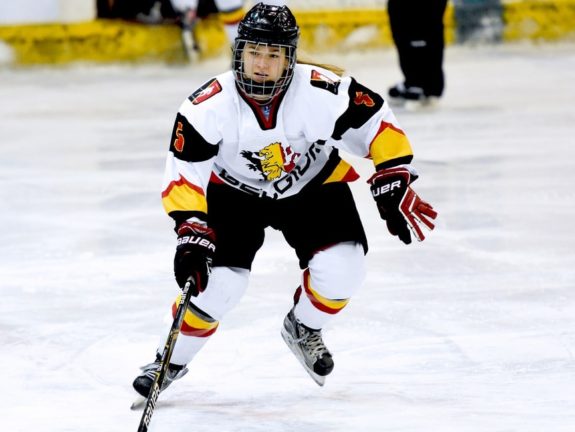
Perhaps there is a CWHL team or an NWHL team who would be willing to give Maka a shot? She is in her early-20s and has completed her studies. What better way to grow and support the women’s game than by providing opportunities to players overseas. Heading into the 2018-19 NWHL season, there have already been a couple European signings with the first Czech (Katerina Mrázová, Connecticut Whale) and first Swedish player (Michelle Löwenhielm, Connecticut Whale) to join the league. Given the right set of circumstances, perhaps an offer should be extended to Maka. It’s certainly something that she has thought about.
“I have,” she said when asked about the possibility of playing pro hockey. “The thing is that I’ve never had the opportunity to do so… yet. I was always focused on my studies, but I have a psychology degree now. I guess being able to play pro would be my biggest goal and also my biggest dream.”
Teams ought to take note and consider contacting this young lady. She would not disappoint.